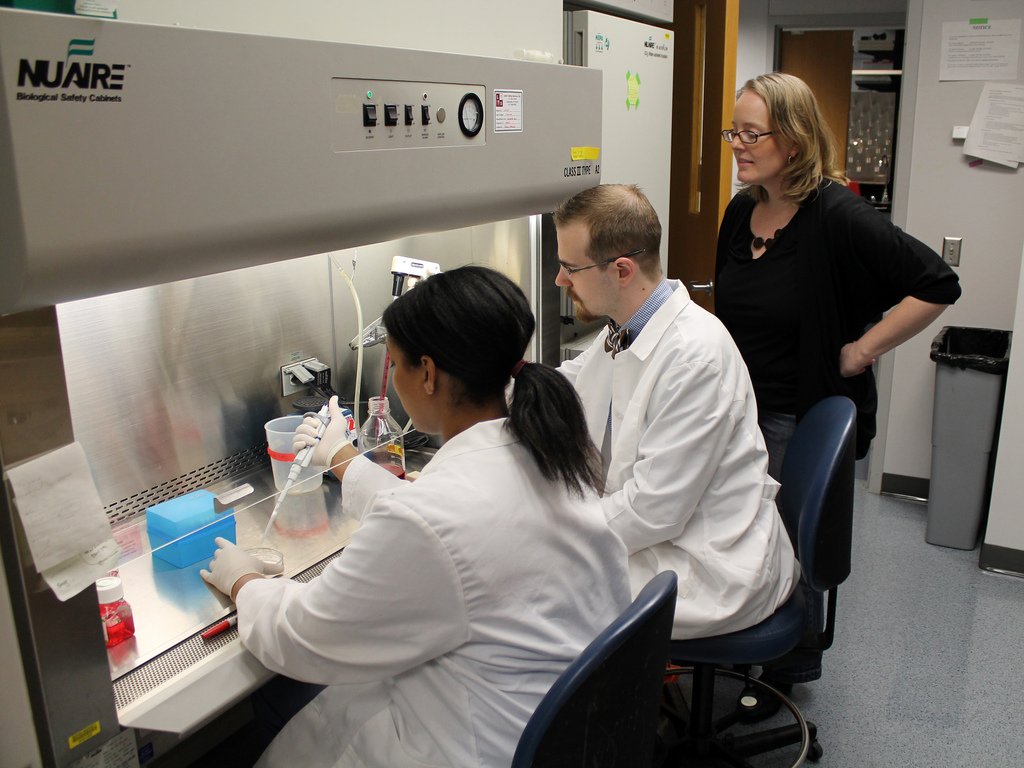Dr. Peter Janiszewski recalls when his job in medical affairs came into sharp focus. He was giving a scientific presentation to a group of pharmacists on the drug Fibristal, a new option at that time for uterine fibroids. An audience member came up to him afterwards. She was in tears.
Janiszewski explained, “She had undergone a hysterectomy prior to this medication being on the market and she said, ‘how I wish this was available when I had this problem’.
“Any time you’re taking a patient from a diagnosis that guarantees a difficult procedure to something that makes life a lot easier without any of that risk – that’s a pretty good place to be in terms of waking up in the morning inspired and feeling like you’re doing some good in the world.”
Janiszewski is Associate Director of Medical Affairs and Therapeutic Area Lead for Gastroenterology and Hepatology at Allergan, a global pharma of 17,000 employees with US operations centred in Madison, NJ.
Janiszewski started at Allergan in 2015 as a medical science liaison (MSL) for the company’s women’s health franchise. MSLs are company representatives with scientific or medical training who discuss a broad range of disease topics with healthcare professionals (unlike sales representatives, who follow strict guidelines and only talk about drugs.) Janiszewski’s job took him on the road across Canada presenting on the science behind drugs such as Fibristal.
In his new Associate Director role at the Canadian head office, Janiszewski is relishing the learning curve of a brand-new therapeutic area after four years in women’s health.
“Gastroenterology appealed to me because I’ve always liked to move between different topics,” he said. “Even with my PhD, after two or three years digging at one specific question, I had satisfied my curiosity and realized there was a lot of more to learn.”
New Drug Pipelines
He’s also excited to get stuck into the Allergan research pipeline in gastroenterology, which is slated to provide products for previously untreatable diseases such as non-alcoholic steatohepatitis (NASH), a form of fatty liver disease.
“To bring something to the market to help patients that currently don’t have very good options …I’m very excited about being part of the team to deliver on that promise,” he said.
Medical affairs departments at pharmaceutical companies design, manage and, ultimately, share results with healthcare professionals from the complex clinical trials needed for the official go-ahead to sell the drug. To get a foot in the door, a PhD or an MD is usually required, although senior nurse practitioners well connected in a specialized field are not unknown in the role. Whatever the qualifications, the vast majority, like Janiszewski, start as an MSL.
However, job seekers interested in medical affairs need more than a heavy-duty scientific resumé, Janiszewski advises.
Patient-Centred Viewpoint is Essential
The first fit is a willingness to make patients central to every discussion.
“Internally, we’re the voice at the table for the patient, yet it’s interesting because we also know all the clinical data,” he said. “In a sense, the absolute truth stops with us.”
Communication skills are key, too. Medical affairs personnel need to present complex science clearly and effectively to a wide range of audiences, from specialist physicians who are experts in the field down to newly minted sales representatives who need science basics. Janiszewski recalls that every job interview for medical affairs involved a scientific presentation – for good reason, since this became his life once on board.
Cross-Functional Collaboration
It also helps to be an enthusiastic cross-functional collaborator – not necessarily a given for scientists trained to focus on obscure corners of science for years on end.
“You really need to have that collaborative nature where you like working with people with different backgrounds, different priorities, different missions. For a lot of PhDs that’s not necessarily a strength,” said Janiszewski. “So you’ve got to be honest with yourself – do you prefer taking a project on your own or are you happiest working with lots of different people? That’s two different types of personality.”
Then there’s the elephant in the room – the fact that drug companies are primarily out to make a profit for their shareholders. Janiszewski stresses that there’s no incentive for him or his colleagues in medical affairs to sell more drugs, but they do need to understand business basics such as planning activities within budgetary constraints. “That’s not something a lot of PhDs come equipped with,” he said. Janiszewski used personal time to brush up on business skills such as how to evaluate an annual report.
Asking ‘Why’ is Crucial
Management, in general, was new to Janiszewski but in the Associate Director role he is finding opportunities to put into practice a longstanding interest in theories of leadership and how to inspire and engage people. He holds strong opinions on the matter based on his own experiences as an employee.
“Getting people on board with a project isn’t just a matter of handing down instructions; that doesn’t motivate a lot of people – it certainly didn’t motivate me. I need to know, ‘If I’m doing this, why am I doing it, what’s the bigger context behind this ask?’ Starting with ‘why’ is key for me,” he explained.
“If I think of a patient that’s suffering and potentially their life is going to be dramatically improved by us doing this study as quickly and efficiently as possible – now I’m excited, now I’m motivated, now I’m inspired to act.”
The company has harnessed Janiszewski’s interest in leadership practice. As he modestly explained, “through a series of coincidences”, he became an inspirational speaker at Allergan’s national sales meeting in February, a position rarely occupied by members of the medical affairs team. He was asked to speak to the internal audience of approximately 300 people about overcoming challenges.
“I had the opportunity to talk about something other than agonists and receptors and science – more globally about my way of thinking and what has helped me in both career and personal life,” he explained. “We all meet obstacles, difficulties; whether in personal or career life we’re all dealing with stuff, all the time. It’s a bit of a mental shift to say, if you guide yourself through the difficulty, instead of going around, you can end up somewhere better.”
Take Ownership to Overcome Obstacles
For Janiszewski, this goes deeper than glib ‘positive thinking’. It’s about taking ownership, a concept that has interested him more and more over the years.
He said, “A lot of the time we’re worrying about things that are outside our control and trying to change those things that clearly we can’t; whereas, we could have spent that precious time on things that are within our control, that could actually improve our stage in life… [By doing this] you take ownership of the things you’ve been given: of your career, of your success, of the priorities for your role at work.”
A job in medical affairs needs this kind of clear-sighted thinking, because at the end of the day, Janiszewski stresses, patients’ lives could be changed forever by what medical affairs people do.
“It’s a unique, privileged place to work,” he concluded.

Peter Janiszewski is an Associate Director in Medical Affairs and the Therapeutic Area Lead for Gastroenterology. He’s been with Allergan for over 3 years, previously supporting the Women’s Health franchise. In addition to cementing Allergan’s position as a leader in irritable bowel syndrome (IBS) with Constella® and Viberzi®, Peter is excited about bringing patients novel life-changing therapies to treat non-alcoholic steatohepatitis (NASH), diabetic gastroparesis, and inflammatory bowel disease (IBD).












Join or login to leave a comment
JOIN LOGIN